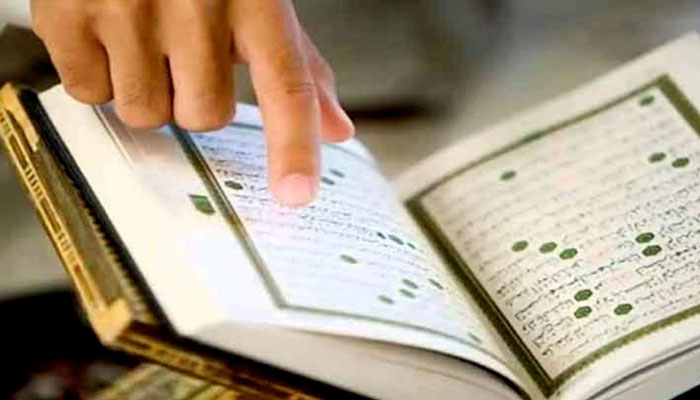Majority schools systems to make Holy Quran teaching compulsory
ISLAMABAD: The country’s major provinces, the federal capital territory, Azad Kashmir and Gilgit Baltistan, have included the compulsory teaching of nazrah Quran as part of their curriculum for the next academic year starting in August 2021. The federal government, Punjab, Khyber Pakhtunkhwa and AJK have already introduced the required legislation whereas Balochistan and Gilgit Baltistan have notified the implementation of the Single National Curriculum, that includes the mandatory teaching of the Holy Quran to students from grade 1-V.
In federal government educational institutions and in KP and Bahawalpur Division of Punjab, the compulsory teaching of the Holy Quran has also been introduced and will now be part of the Single National Curriculum, the first phase of which is being implemented from the next academic session.
Schools that are being run under the Pakistan Army, Airforce and Navy have also adopted the same SNC. In the case of all schools run by Pakistan Navy, teaching of the Holy Quran is already compulsory and the credit for that goes to the former naval chief Zafar Mehmood Abbasi.
Legislation at the federal level and in Punjab was introduced in the previous PMLN tenure in which the then state minister for education in Nawaz Sharif's cabinet, Balighur Rehman, played the pivotal role.
However, the then KP government of Pervez Khattak was the first one to introduce the compulsory teaching of the Holy Quran in its schools.
The present government has made the compulsory teaching of nazrah Quran part of the Single National Curriculum and developed a consensus among all provinces and regions to adopt the SNC. Sindh, however, is still maintaining the position mentioned above.
Under the law, it will be mandatory to impart Quranic education to Muslim students from class I to XII in all schools, whether private or public. According to the law, all educational institutions must compulsorily teach the nazrah Quran in grades I to V and (b) the translation of the Holy Quran in grades VI to XII in such a manner that the entire Holy Quran is taught by grade XII.
Regarding the Urdu translation of the Holy Quran to be taught under this scheme, the education ministry and the Council of Islamic Ideology have already approved a version in consultation with different religious scholars and Ulema bodies that is acceptable to all.
Unlike Punjab, KP, Balochistan and other regions, Sindh, however, has neither enacted any legislation nor decided administratively to implement SNC in the province. Provincial Education Minister Saeed Ghani when approached by The News confirmed that the Sindh government has not taken any such decision.
Ghani said that he had told the federal government that education is a provincial subject, therefore, the federal government cannot implement its choice curriculum in the province. He explained that despite the constitutional position, the Sindh government is willing to compare its curriculum with the syllabus of other provinces to improve it.
Ghani was of the view that the compulsory teaching of the Quran is not part of the Single National Curriculum being launched by the federal government with the consultation of the provinces. However, official sources confirm that the teaching of nazrah Quran is part of the Single National Curriculum.
-
 Blac Chyna Reveals Her New Approach To Love, Healing After Recent Heartbreak
Blac Chyna Reveals Her New Approach To Love, Healing After Recent Heartbreak -
 Royal Family's Approach To Deal With Andrew Finally Revealed
Royal Family's Approach To Deal With Andrew Finally Revealed -
 Super Bowl Weekend Deals Blow To 'Melania' Documentary's Box Office
Super Bowl Weekend Deals Blow To 'Melania' Documentary's Box Office -
 Meghan Markle Shares Glitzy Clips From Fifteen Percent Pledge Gala
Meghan Markle Shares Glitzy Clips From Fifteen Percent Pledge Gala -
 Melissa Jon Hart Explains Rare Reason Behind Not Revisting Old Roles
Melissa Jon Hart Explains Rare Reason Behind Not Revisting Old Roles -
 Meghan Markle Eyeing On ‘Queen’ As Ultimate Goal
Meghan Markle Eyeing On ‘Queen’ As Ultimate Goal -
 Kate Middleton Insists She Would Never Undermine Queen Camilla
Kate Middleton Insists She Would Never Undermine Queen Camilla -
 Japan Elects Takaichi As First Woman Prime Minister After Sweeping Vote
Japan Elects Takaichi As First Woman Prime Minister After Sweeping Vote -
 King Charles 'terrified' Andrew's Scandal Will End His Reign
King Charles 'terrified' Andrew's Scandal Will End His Reign -
 Winter Olympics 2026: Lindsey Vonn’s Olympic Comeback Ends In Devastating Downhill Crash
Winter Olympics 2026: Lindsey Vonn’s Olympic Comeback Ends In Devastating Downhill Crash -
 Adrien Brody Opens Up About His Football Fandom Amid '2026 Super Bowl'
Adrien Brody Opens Up About His Football Fandom Amid '2026 Super Bowl' -
 Barbra Streisand's Obsession With Cloning Revealed
Barbra Streisand's Obsession With Cloning Revealed -
 What Did Olivia Colman Tell Her Husband About Her Gender?
What Did Olivia Colman Tell Her Husband About Her Gender? -
 'We Were Deceived': Noam Chomsky's Wife Regrets Epstein Association
'We Were Deceived': Noam Chomsky's Wife Regrets Epstein Association -
 Patriots' WAGs Slam Cardi B Amid Plans For Super Bowl Party: She Is 'attention-seeker'
Patriots' WAGs Slam Cardi B Amid Plans For Super Bowl Party: She Is 'attention-seeker' -
 Martha Stewart On Surviving Rigorous Times Amid Upcoming Memoir Release
Martha Stewart On Surviving Rigorous Times Amid Upcoming Memoir Release




